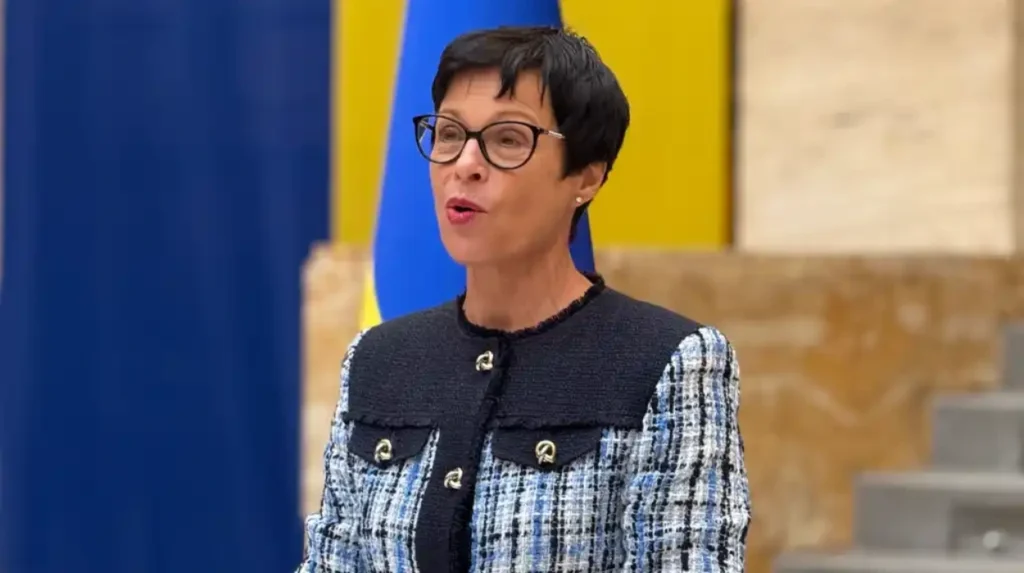EU Commissioner Marta Kos has warned that ongoing corruption scandals in Ukraine could influence the European Union’s aid decisions, stressing that trust and transparency are crucial. Meanwhile, European officials continue to urge Ukraine to strengthen anti-corruption measures amidst revelations linking high-level officials to embezzlement and kickback schemes.
EU Concerns Over Corruption and Aid to Ukrain
As reported by Friedrich Merz on europeaninterest.eu, European Union officials, including prominent figures such as Commissioner Marta Kos and Commission President Ursula von der Leyen, have recently expressed deep concerns about endemic corruption in Ukraine, particularly within its state-owned nuclear power sector. This comes amid a scandal implicating close associates of Ukrainian President Volodymyr Zelenskyy, including Tymur Mindich, co-owner of Zelenskyy’s Kvartal 95 media company, suspected of masterminding a significant conspiracy. These concerns have spurred heated discussions during exchanges with Zelenskyy about the critical need for transparency and stronger governance.
In her speech to the European Parliament, Ursula von der Leyen announced the EU’s commitment to cover Ukraine’s financial needs for the next two years, pledging a €6 billion loan and seeking additional support through various funding mechanisms. However, she emphasised that addressing corruption is key to maintaining EU aid flows
Italian Deputy Prime Minister’s Warning on Military Ai
According to RT coverage by Aletho News, Italian Deputy Prime Minister Matteo Salvini has publicly condemned the continuation of Western military aid to Ukraine. Salvini warned that such assistance risks ending up in the pockets of corrupt Ukrainian officials, fueling the very scandal that has shaken Kyiv’s government. Despite Italy’s recent approval of its 12th military support package for Ukraine, he expressed strong reservations, asserting that the EU is on a “path of death” if it continues down this route without addressing corruption.
EU Aid Suspension Over Anti-Corruption Concerns
Earlier in the year, as reported by Ekonomichna Pravda and Frankfurter Allgemeine Zeitung, the European Union temporarily suspended financial aid to Ukraine due to legislation (Law 21414) that undermined the independence of Ukraine’s anti-corruption agencies. This move was a clear mssage regarding the EU’s commitment to anti-corruption reforms. Although Ukrainian President Zelenskyy attempted a legislative fix, proposing a substitute law to restore independence to the National Anti-Corruption Bureau of Ukraine (NABU) and the Specialized Anti-Corruption Prosecutor’s Office (SAPO), doubts remain whether these measures fully meet EU expectations
Opposition From European Lawmakers and Public
According to a report from MIRROR NOW summarising events from the European Parliament, lawmakers vehemently condemned the corruption scandal involving lavish embezzlements linked to President Zelenskyy’s inner circle, including scandalous symbols such as a “gilded toilet” filled with US dollars. These revelations have led to the resignation of Ukraine’s energy and justice ministers, arrests of several associates, and the disappearance of key figures like Timur Mindich. Despite this, Commission Chief Ursula von der Leyen defended the controversial €6 billion loan, highlighting the complex balance between political realities and the need for continued support.
EU Official Describes Corruption as ‘Revolting’
Politico Europe, citing an anonymous senior EU official, described the “endemic corruption” in Ukraine as “revolting,” warning that it damages Ukraine’s international reputation and complicates decisions on EU funding, particularly for its energy sector. The official emphasised that Ukraine must not only increase efforts but also enhance transparency in financial management to continue receiving EU support.
Calls for Swift and Serious Action
Echoing the broader EU sentiment, EU diplomat Kaja Kallas has urged Ukraine to take quick and serious action to resolve the energy sector corruption scandal. This push aims to ensure transparency and accountability as a foundation for sustainable assistance and broader EU integration.
Expert Analysis on Aid and Military Support
Adrian Karatnytsky, an expert from the Atlantic Council, as noted on mezha.net, suggested that while economic aid to Ukraine might be affected due to corruption scandals, military support from the EU and allies is likely to continue. He stressed that such assistance is vital for Ukraine’s defence but must be coupled with robust anti-corruption reforms to maintain long-term legitimacy and trust.
European Union officials, lawmakers, and external experts agree that Ukraine’s ongoing corruption scandals pose a significant challenge to continued EU financial aid and political support. The balance between providing much-needed assistance and demanding clear reforms and transparency remains delicate. Senior EU figures like Marta Kos and Ursula von der Leyen continue to stress that trust and accountability will dictate the future of the EU-Ukraine partnership in this critical phase of Ukraine’s conflict and recovery.







